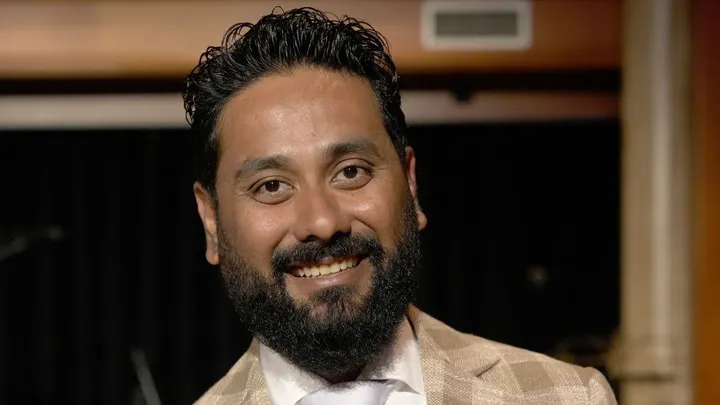
When my buddy, Sabyasachi (Saby) Sengupta stepped off stage because the 2025 Toastmasters World Champion of Public Talking in Philadelphia, I couldn’t have been happier. However I additionally realized one thing: our two-month teaching journey had taught me as a lot because it taught him.
By way of our written exchanges and reside classes collectively, I used to be reminded of some important classes concerning the coach–speaker relationship.
These classes apply not solely to world championship speeches, however to any state of affairs the place one individual helps one other put together to talk.
Setting the Basis
1. Don’t overwhelm
After I supplied to assist Saby, I despatched him a textual content message that contained the next: “You’ll undoubtedly be inundated with gives from folks that can assist you. I’m comfortable to assist in any method I can, however it’s good to keep away from being overwhelmed with an excessive amount of recommendation. So, no worries should you really feel you have already got sufficient help. You might want to tempo your self. Better of luck no matter you determine.”
Audio system at this degree are bombarded with suggestions. An excessive amount of enter can paralyze quite than assist. Teaching begins with humility. You’re there to serve, to not take over.
Takeaway: Provide assist with out including strain.
2. Begin with their wants
The primary query I requested was not, “Right here’s what I feel it’s best to change.” It was, “What are you searching for from me?”
That one query framed all the relationship. It made positive we have been aligned from the start. Teaching just isn’t about your ego or your agenda; it’s about assembly the speaker the place they’re.
Takeaway: Start by asking, not telling.
3. Focus in your distinctive worth
I knew the areas the place I might add probably the most worth: speech construction, humour, rhetorical units and phrasing. These are my strengths.
After all, we additionally touched on physique language and voice and I did make options, however these are areas the place Saby is of course stronger than me. So, I didn’t attempt to be the skilled there. As an alternative, I complemented his talents.
Takeaway: Concentrate on what you are able to do greatest.
Shaping the Speech
4. Know when to push, when to step again
There have been occasions I made options and Saby wasn’t comfy with them. The options weren’t unsuitable; they only weren’t for him. If the purpose wasn’t crucial, I stepped again. It’s important to respect the speaker’s judgment.
However after I knew one thing would make a measurable distinction—like a specific pause that might arrange amusing, or a specific method of wording a sentence—I pushed more durable. We went over it till Saby felt it, and when it landed, he noticed why it mattered.
Takeaway: Not each hill is value dying on. Save your insistence for the moments that actually elevate the speech.
5. Respect the teaching village
Saby had one other primary coach, and he additionally obtained suggestions from many individuals. At occasions, he should have been inundated with options.
That required me to verify my ego. I used to be one voice amongst many, not the voice. My position was so as to add worth the place I might, to not management the method.
Takeaway: Be a voice, not the voice.
Ultimate Preparation
6. Lock the speech down
As the competition drew nearer, my instructed modifications turned fewer and fewer. Sooner or later, it’s a must to cease tweaking and lock the speech down.
Infinite revisions erode confidence. In these closing days, my position was much less about modifying the speech and extra about serving to Saby be in the proper state of mind.
Takeaway: Cease revising; begin rehearsing. Good teaching includes realizing when to modify from the previous to the latter.
7. Worth the “dangerous” rehearsals
Not each apply run went properly. Generally Saby delivered a model that wasn’t excellent.
However I at all times noticed that as a constructive. I instructed him, “Good! We’re getting the dangerous stuff out now!” Rehearsal is the place for errors. That’s the way you sharpen a speech.
Takeaway: Sweat in apply so that you don’t bleed in battle.
Overarching Rules
8. Give particular suggestions
“Good job” or “That didn’t work” isn’t sufficient. Suggestions solely helps whether it is exact.
So as an alternative of claiming, “Make it funnier,” I might level to a particular line and recommend a wordplay, a call-back, or a rhetorical twist. The extra concrete the suggestions, the quicker the progress.
Takeaway: Give suggestions that’s clear, concrete and instantly actionable.
9. Present emotional help
Getting ready for the largest stage in public talking isn’t just technical; it’s emotional. Doubts creep in. Nerves rise. Vitality dips.
After we started our final teaching name (the day earlier than the Ultimate), the very first thing I did was to have Saby shut his eyes and we did the “field respiration” train to sluggish issues down and get in the proper headspace for the decision.
One of the vital vital issues a coach can do is present perspective, calm, and encouragement. Generally, the proper phrases usually are not concerning the speech, however concerning the speaker.
Takeaway: Teaching is as a lot about grounding the individual as it’s about refining the efficiency.
Conclusion
Teaching a speaker at this degree just isn’t about giving limitless notes. It’s about partnership, belief and readability. It’s about realizing when to talk, when to remain silent, and when to easily encourage.
Whether or not you might be serving to a colleague with their first presentation or working with a World Champion, these classes apply.
Ultimately, the perfect coaches don’t put phrases in another person’s mouth.
They create the situations for the speaker’s personal voice to shine.